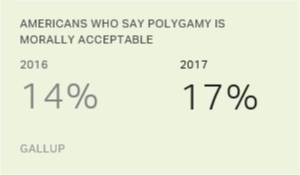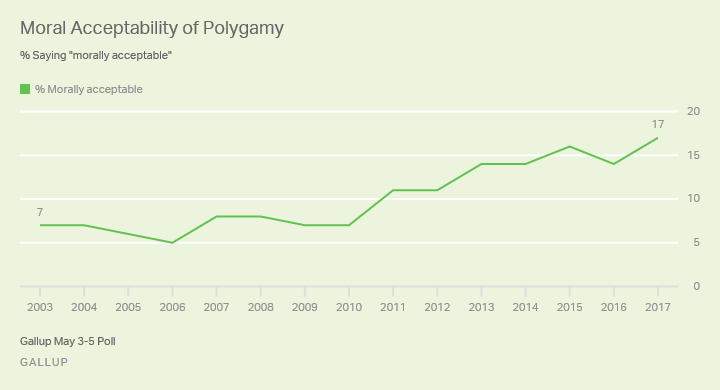
Polygamy, a practice that President James Garfield once said “offends the moral sense,” is now seen by 17% of Americans as “morally acceptable,” up from 14% in 2016 and the highest rate on record dating back to 2003.

These results come from the May 3-7 Gallup Values and Beliefs poll. Despite growing acceptance of the practice over the last 15 years, polygamy, or having multiple spouses at one time, remains one of the most morally taboo social behaviors in the eyes of Americans.
Indeed, for the first seven years (2003-2010) Gallup measured Americans’ moral perceptions of polygamy, the rate of U.S. adults who said it was “morally acceptable” was always in the single digits.
In 2011, the share of Americans who found polygamy “morally acceptable” rose slightly to 11%, but the increase coincided with a change in how the word “polygamy” was defined in the survey. Prior to 2011, polygamy was defined as being when “a husband has more than one wife at the same time.” Beginning in 2011, this definition became gender-neutral, instead identifying polygamy as when “a married person has more than one spouse at the same time.”
While this change in question wording may have provided a slight bump in the percentage of Americans accepting of polygamy, it is probably not responsible for the more recent rise in this figure. Over the last five years, the percentage of Americans who think polygamy is morally acceptable edged up from slightly more than one in 10 (11% in 2012) to just under one in five (17% in 2017).
Granted, this increase is slight by any standard, and may simply be the result of the broader leftward shift on moral issues Americans have exhibited in recent years. Or, as conservative columnist Ross Douthat notes in his New York Times blog, “Polygamy is bobbing forward in social liberalism’s wake …” To Douthat and other social conservatives, warming attitudes toward polygamy is a logical consequence of changing social norms — that values underpinning social liberalism offer “no compelling grounds for limiting the number of people who might wish to marry.”
It is certainly true that moral perceptions have significantly, fundamentally changed on a number of social issues or behaviors since 2001 — most notably, gay/lesbian relations, having a baby outside of wedlock, sex between unmarried men and women, and divorce. But these attitudinal changes did not occur in isolation. They have occurred alongside important cultural and legal changes, including the rising propensity of divorce following changes to state laws at the end of the 20th century and the gay rights movement that ultimately succeeded in legalizing same-sex marriage in 2015, to name a few.
No such shifts have occurred with respect to polygamy. It remains illegal in all 50 states. And only this year, the state House of Utah, a state that outlawed the practice in 1895 in order to gain admission into the union, passed a bill that would, among other things, increase the penalties for convicted polygamists. And while academic research finds that covert polygamous marriages do exist in the U.S., they are uncommon and are largely confined to some immigrant Muslim groups and Mormon sects that have broken away from the mainstream church.
In short, there is little reason to believe that Americans are more likely to know or be polygamists now than at any other time in the past. But there is one way Americans may feel more familiar with or sympathetic to polygamy: television.
Beginning in the mid-2000s, television shows began to feature polygamist characters — though these depictions were not always favorable. The TLC show “Sister Wives” premiered in 2010, and according to The Washington Post, humanized a family of polygamists. The show was successful and remains on the air. Notably, over the time it has been on the air, Gallup has seen support for polygamy rise by nearly 10 percentage points, although it is impossible to establish any direct causality between the show and changing attitudes.
This is not to say that the rising level of social liberalism in this country has not, for whatever reason, increased acceptance of polygamy. Many of the moral norms that have changed the most in the U.S. over the last few decades are related to sex and marriage — including gay/lesbian relations, divorce and having a baby out of wedlock. But this is not true across the board. Having an extramarital affair, for instance, remains as morally toxic this year as it was in 2001, with about one in 10 Americans finding it morally acceptable (10% in 2017 and 7% in 2001).
Non-Religious and Non-Christians Most Accepting of Polygamy
Though polygamous societies often justify their lifestyle on religious grounds, it is Americans who do not identify with any religion who are most accepting of the practice. Between 2011 and 2017, 32% of Americans who do not associate with a particular religion or have no religion at all said polygamy was “morally acceptable.” This follows the general tendency for those who are less religious to be more liberal on social issues.
Americans who identify with a Christian religion are less likely than the overall sample average to find polygamy morally tolerable.
This includes Mormons. Gallup’s sample between 2011 and 2017 includes 167 Americans who identify their religion as Mormon or Latter-day Saints. This small sample size invokes the need for caution in interpretation given the wide margin of error associated with it, but it is notable that the 12% of Mormons who find polygamy morally acceptable is roughly the same as the figure for Protestants/other Christians (9%) and Catholics (10%).




Comments